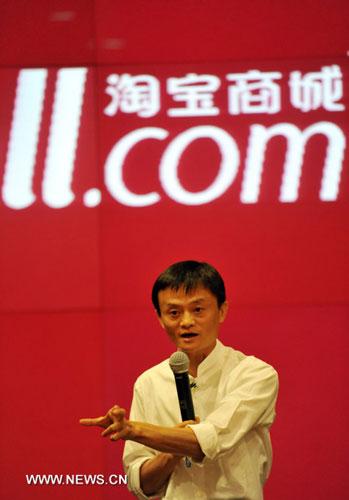
Jack Ma, president of Taobao Mall's parent company Alibaba Group, speaks during a press conference in Hangzhou, capital of east China's Zhejiang Province on Monday, October 17, 2011. Taobao Mall, China's largest business-to-consumer platform, announced Monday that it will postpone raising its annual service fees and deposits for its registered sellers, after its small vendors protested the move. [Photo: Xinhua/Huang Zongzhi]
China's largest business-to-consumer platform, Taobao Mall, announced Monday that it will postpone raising its annual service fees and deposits for its registered sellers, after its small vendors protested the move.
Taobao Mall intends to increase its annual service fees for businesses currently registered from 6,000 yuan (942 U.S. dollars) to 30,000 or 60,000 yuan from October 2012, according to Jack Ma, president of Taobao Mall's parent company Alibaba Group, at a press conference Monday afternoon.
The platform said in an earlier announcement that it will charge higher service fees at the end of this year, triggering online protests carried out by tens of thousands of small vendors.
The vendors started protesting Tuesday night by buying up goods from bigger vendors and then asking for refunds or filing complaints in order to interrupt their business.
They claimed they will be disadvantaged under the new policy as only the larger businesses can easily afford the increase.
More than 20 online stores hosted by Taobao Mall were forced to stop selling their products, and some of them still have not resumed normal business.
In response, Taobao Mall has postponed the fee hike for nine months and promised to invest a total of 180 million yuan to support its registered sellers, but has not said it will cut service fees.
According to Ma, the compulsory fixed sum deposit will be increased from 10,000 yuan to up to 150,000 yuan in 2012, but registered sellers only need to pay 50 percent of the required sum as Taobao Mall will pay for the rest.
He said Alibaba Group will also set aside 500 million yuan as a loan guarantee for small businesses that have difficulties gaining bank loans.
The group will also add 300 million yuan to its budget on marketing and technological service improvement, as a way to increase support for registered businesses.
Ma said Taobao Mall will not give into the demands of the small vendors. But he admitted that the new policy may not have been introduced in the right way.
He said the fee hike is part of the group's efforts to bring order to the country's growing e-commerce sector. Fighting fraud and the sale of counterfeit products is key to the healthy development of e-commerce.
According to Ma, one third of the total transaction value of Taobao Marketplace and Taobao Mall come from small businesses from third-tier cities.
E-commerce might be the best way to boost domestic demand and create job opportunities, said Ma.
He said the new policy will be a successful one as it will only force an estimated five percent of all the registered sellers to leave Taobao Mall.
Daniel Zhang, president of Taobao Mall, said as long as they adhere to the company's business standards, they can get their money back eventually.
He also explained that small-sized businesses have the option of entering the Taobao Marketplace, a consumer-to-consumer platform that does not charge service fees.
However, many small business owners are not satisfied with the revised policy, demanding face-to-face talks with Taobao Mall's top executives.
"I feel cheated because Taobao Mall approved the entry of businesses of any size when it first opened, in order to secure rapid expansion. But now it is kicking us all out," said a vendor who goes by the alias of "KushangChaonan."
Daniel Zhang, however, said Taobao Mall will not talk with vendors that disturbed larger-sized online business, but will listen to suggestions put forward through legal means.
He said he believed Taobao Mall revised the new policy in accordance with a request put forward by the Ministry of Commerce (MOC).
On Saturday night, the MOC said in an article posted on its official website that all parties concerned should stop disputing the move in order to stabilize prices and support small businesses.
While Taobao Mall should accept reasonable requests from merchandisers, the owners of small businesses should express their requests through legal means, the MOC said.
Taobao Mall is an offshoot of e-commerce firm Taobao, China's largest shopping website.
Commodities sold on Taobao Mall range from daily necessities such as bread and fruit to home appliances and cars.
Taobao Mall was set up in 2008 and hosts more than 400 million registered users, 50,000 registered businesses and 70,000 brands.





